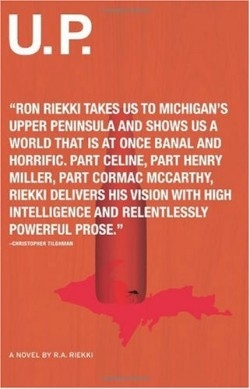
U.P.
A Novel
“The U.P.‘s greatest export is drunk drivers; its greatest import is cold weather,” writes R.A. Riekki, who has been paroled from a life sentence in Michigan’s Upper Peninsula. By mercilessly displaying the warts of Yooper culture, Riekki has probably made himself as unwel-come as Thomas Wolfe did by writing Look Homeward, Angel. Or else he’ll be named grand marshal for a parade. Yoopers don’t get much attention.
U.P. rolls through a decent enough plot of conflict, striving, and ennui, but characterization reigns supreme, as long as the location itself can also be a character. Set around Ishpeming, a mining-based suburb of Marquette, four teenage narrators are living so hardscrabble, displaying such poorly adjusted psyches, that they should throw in the towel on life to save further agony. This is an ambitious literary novel stripped down to utter rawness. There’s as much sex as an episode of the Jerry Springer Show, and the violence is nearly on par with the nightly news.
Antony, who once lived in Detroit, thinks of himself as black, though he isn’t, listens to rap, narrates in hip-hop vernacular, and obsesses on re-venge after an Indian kid demolishes his shoulder with a baseball bat. Cräig is a head-banging Slayer fan, a jock, and a hugely muscled weightlifter with a sex addiction. J, whose legs are damaged by cerebral palsy, is a constantly depressed worshipper of Sid Vicious, Iggy Pop, marijuana, and his mostly absent father. They’re all cousins to Hollow, an atheist dating a religious girl, a pacifist considering joining the military. Hollow doesn’t drink or deal with true emotions, since his brother was killed by a drunk. The four use such distinctly different thought processes that it would be possible to identify speakers without names. Of them, Cräig’s sections emerge as car-wreck fascinating. He’s capable of intense anger and pleasure. He seems to realize that something isn’t quite right within, but self-control and the will to turn things around aren’t accessible.
Despite Riekki’s perfectly authentic rendering of the Upper Peninsula’s unique conditions, the style isn’t as much Midwestern as it is Southern grit-lit. Think of a still-developing version of the great Larry Brown, or the cockeyed perspectives of Harry Crews and George Singleton, minus a bit of the humor. The approach seems counterintuitive but it works beautifully, because the hopeless underclass of the two regions share atti-tudes: disdain for authority, a touch of fatalism, suspicion of outsiders. Riekki calls certain residents “snow Confederates.”
Hollow tells readers “If it were not for friendships, we would all self-destruct.” Staking his claim to an under-populated corner of Realism with this iron-hard debut novel, Riekki lets us know that even friendship or good intentions don’t always prevent a fall into the bottomless abyss. (November
Disclosure: This article is not an endorsement, but a review. The publisher of this book provided free copies of the book to have their book reviewed by a professional reviewer. No fee was paid by the publisher for this review. Foreword Reviews only recommends books that we love. Foreword Magazine, Inc. is disclosing this in accordance with the Federal Trade Commission’s 16 CFR, Part 255.
